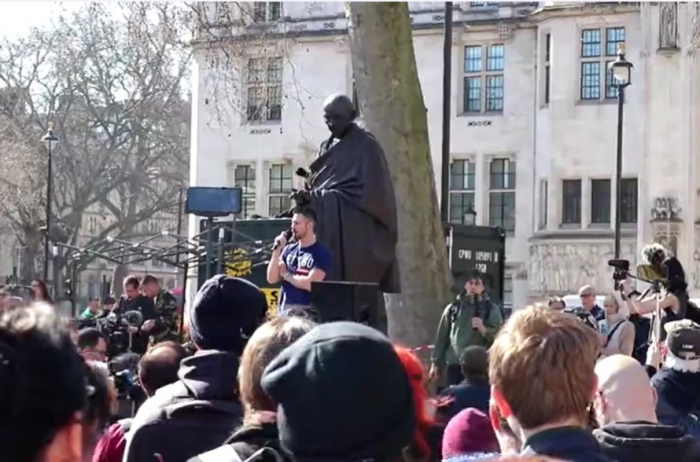Marion Isabeau Ringuette claims she was wrongfully axed as director of communications for Ontario’s solicitor general for Premier Doug Ford’s “personal political gain” — allowing him to show public opposition to the convoy — in a lawsuit against Ford, his chief of staff, the Ontario government, Toronto Star Newspapers Limited, and two journalists.
In her statement of claim, Ringuette says she was promoted to her job in February 2020 and was a rarity in Ford’s government: a fully bilingual political staffer.
None of the allegations in the statement of claim have been tested in court.
She said she followed government directives, including canceling travel plans to visit family in Texas for the 2021 Christmas holidays in keeping with Ford’s policy against travel during COVID-19 restrictions.
On Feb. 5, Ringuette donated $100 to the protest, called the Freedom Convoy, after a group of truckers and others opposed to vaccine mandates and other grievances rolled into Ottawa the week before. The protest became increasingly controversial during its occupation of city streets.
Her lawsuit says her donation was made when there was no government policy against the protest and a day before the city of Ottawa declared a state of emergency. The province didn’t take a position against the convoy protest until Feb. 10, making her private donation legal and not against government policy, according to her claim.
“Ms. Ringuette had every expectation that her donation would be private and confidential,” her suit says.
GiveSendGo began hosting the protest’s fundraising after it was banned from the more mainstream site GoFundMe. The GiveSendGo site was hacked on Feb. 13.
The hack was openly declared an activist attack and a database of the information entered by donors was made publicly available.
It included information on 92,844 donations totaling more than $8.4 million, such as the name, email address, the amount given, postal code, country, and Internet Protocol address of the donor, and how the payment was made. The leaked data did not include credit card numbers.
It allowed analysts, news organizations, and critics to look at where the protest’s money was coming from.
The data unveiled names behind the donations, some of whom were prominent or had jobs making their support publicly awkward.
Ringuette was one of them.
Her $100 donation was made under the initials, M.R., but the leaked data included a personal email address containing her name.
A journalist made the connection to Ringuette.
On Feb. 15, Charles Pinkerton, interim editor of QP Briefing, a publication focusing on Ontario politics owned by the Toronto Star, called Ringuette on her cell phone, her claim says. She didn’t answer. He then texted her, but she ignored the text. He then emailed both her work and personal email addresses asking her to confirm her job with the government and her donation to the convoy, her claim says.
A similar email was sent to the premier’s office.
Within minutes she was called by her immediate supervisor, David Garland, who asked if she had donated to the convoy. She said she had.
“The premier’s office wanted to fire her,” she was told, according to her claim. Garland said he would try to intervene but called back several minutes later and said she had been fired “because they wanted to be seen as acting ‘quickly,’” according to the claim.
Someone from Ford’s office came onto the line and confirmed she was fired with 16 weeks of severance, she claims.
The government then replied to Pinkerton’s email saying Ringuette was no longer working for the government, her claim says.
Ringuette’s lawsuit says the government’s response confirmed her identity as a donor, allowing public disclosure of her personal information.
Pinkerton and Andrew Takagi, a reporter at QP Briefing, shared the byline on a Feb. 15 story on qpbriefing.com with the headline “Senior staffer of solicitor general out of job after donating to ‘Freedom Convoy’.” They also co-authored a story repeating the information on iPolitics.ca.
Ringuette’s suit against the two journalists and their employer claims they “acted in callous disregard” for her privacy and the damage the “politically controversial” information would have on her career.
The suit also accuses Ford and his chief of staff, James Wallace, of acting in bad faith.
“A provincial election was imminent and Premier Ford’s decision to terminate Ms. Ringuette’s employment was based on his and his campaign team’s belief that it would benefit him politically to, finally, oppose the Freedom Convoy,” the suit alleges.
Ringuette seeks $450,000 from the government and its officials for wrongful dismissal, in addition to a joint claim against all defendants for $1.5 million for invasion of privacy, public disclosure of private fact, damage to reputation, and emotional distress.
The National Post contacted the premier’s office, the Toronto Star, and Queen’s Park Briefing for comment, but received no replies by press time.
Some news stories on the donors treated the data in an aggregated or anonymous form. Others revealed names if they could confirm the identity, or if the donor acknowledged they made it. This included National Post and some other Postmedia newspapers.
For news organizations, it was usually reserved for government officials, civil servants, or publicly prominent people, in a bid to hold institutions and public figures to account. Some business owners also received coverage.
After the names became public, through news stories or on social media, several people lost or left their jobs. At least one person was publicly misidentified, an Alberta judge who shares a name with a donor.












